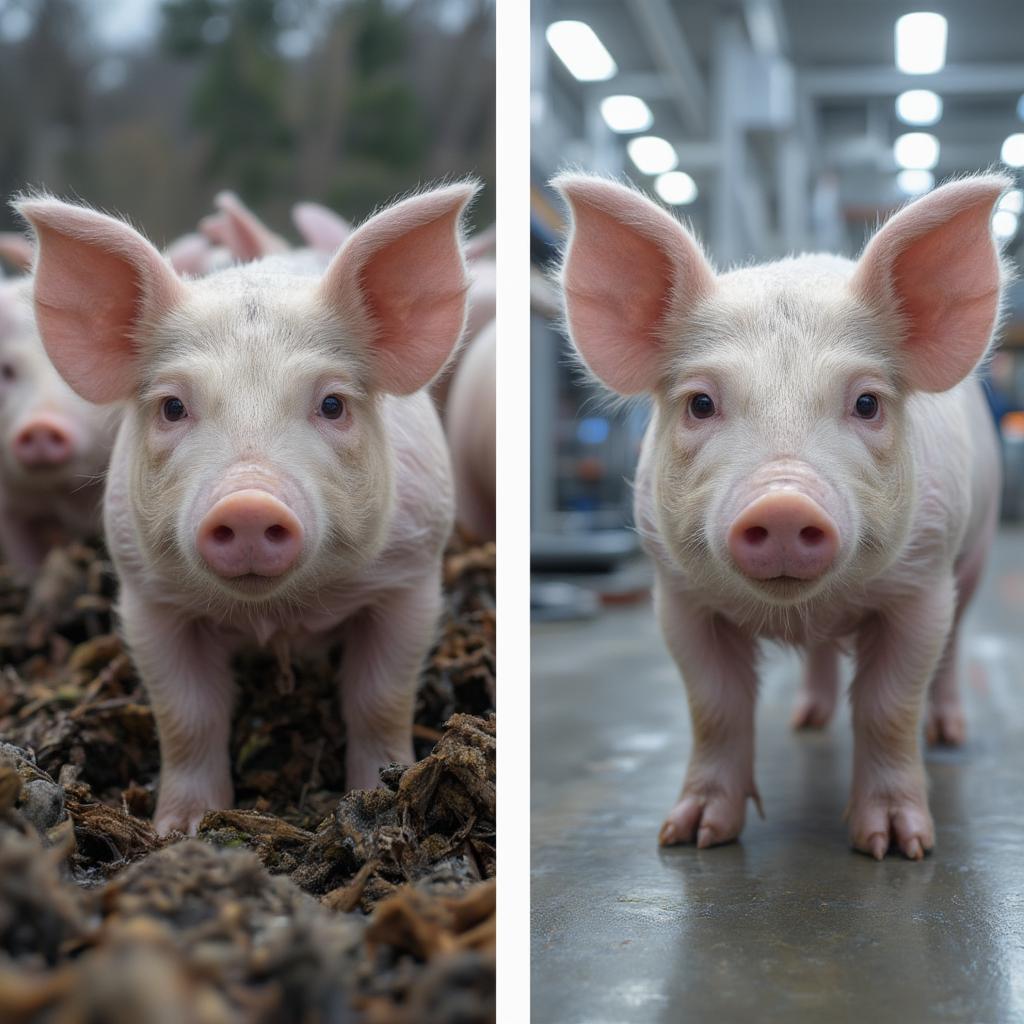Why we love dogs, wear cows, and eat pigs is a question that taps into our complex relationship with the animal kingdom. It highlights the seemingly arbitrary lines we draw between companion, commodity, and food source. This exploration delves into the ethical, cultural, and biological factors that shape our interactions with these three species.
The Human-Animal Bond: Dogs as Companions
Humans have a unique relationship with dogs, a bond that has developed over millennia. From working dogs assisting in herding and hunting to therapy dogs providing emotional support, dogs have integrated themselves into our lives in countless ways. Their loyalty, trainability, and capacity for affection contribute to their status as beloved companions. Many dog owners consider their pets to be family members, providing them with love, care, and even celebrating their birthdays. This close relationship is reflected in the emotional support dogs offer, often sensing and responding to their owner’s emotional state. This explains why so many people love dogs. You can learn more about this special connection in our article on why dogs love humans.
The Science of Dog-Human Affection
Studies have shown that interacting with dogs can lower stress levels and increase feelings of well-being in humans. The release of oxytocin, a hormone associated with bonding and love, is observed in both dogs and humans during interactions, further solidifying the scientific basis for this powerful connection. This reciprocal affection contributes to the enduring strength of the dog-human bond. But what about other animals? Why do our relationships with cows and pigs differ so dramatically?
Cows: From Sacred Symbol to Leather Source
Cows hold a different position in human society. In some cultures, they are revered as sacred symbols of life and sustenance. However, in many Western cultures, they are primarily viewed as a source of food and leather. This utilitarian perspective has led to the development of intensive farming practices that prioritize efficiency and output over animal welfare. The leather industry, a significant byproduct of the meat industry, utilizes cowhide to produce a wide range of goods. This duality – reverence in some cultures and commodification in others – reflects the complex and often contradictory ways humans interact with the animal world.
The Ethics of Leather Production
The ethical implications of using cowhide for leather are a subject of ongoing debate. While some argue that it is a sustainable use of a byproduct, others raise concerns about the treatment of animals in the leather industry. The rising popularity of vegan leather alternatives reflects a growing awareness of these ethical concerns. This leads us to the final piece of the puzzle: our relationship with pigs. Why are they primarily a food source, while dogs are companions and cows are both?
Pigs: Food Source and More
 Pigs in a farm setting, contrasted with a lab setting
Pigs in a farm setting, contrasted with a lab setting
Pigs, like cows, are primarily raised for food in many cultures. Their physiology and rapid growth make them an efficient source of meat. However, pigs are also intelligent and social animals. Increasingly, they are being recognized for their cognitive abilities and even used in medical research due to their physiological similarities to humans.
Beyond Bacon: The Multifaceted Nature of Pigs
The perception of pigs solely as a food source overlooks their complex nature. Their intelligence and capacity for emotion raise ethical questions about their treatment in factory farming. The growing awareness of these issues has led to a push for more humane farming practices and a greater appreciation for the multifaceted nature of these animals. Similar questions arise regarding our consumption of cows and love for dogs – why are our relationships with these animals so different? You can find more insight into this topic in our article on why we eat pigs wear cows and love dogs.
Conclusion
Why we love dogs, wear cows, and eat pigs is a complex question with no easy answers. Our relationships with these animals are shaped by a confluence of cultural, historical, and biological factors. As our understanding of animal cognition and sentience evolves, so too must our ethical considerations regarding our interactions with them. The ongoing dialogue about animal welfare and the development of alternative materials like vegan leather suggest a shift towards a more nuanced and compassionate approach to our relationships with the animal kingdom. This reflection on why we love dogs, wear cows, and eat pigs encourages us to examine our own choices and consider the impact we have on the lives of these animals.
FAQ
- Why are dogs considered man’s best friend?
- What are the ethical implications of the leather industry?
- Are pigs more intelligent than we think?
- How do cultural factors influence our relationships with animals?
- What are the alternatives to using animals for food and clothing?
- Why do we form such strong bonds with some animals and not others?
- How can we ensure the humane treatment of animals raised for food?
Situations involving these questions:
- Dinner table conversations: Discussing food choices and the ethics of meat consumption.
- Shopping for clothes: Considering the origin of leather goods and exploring vegan alternatives.
- Interacting with pets: Reflecting on the human-animal bond and the responsibilities of pet ownership.
- Visiting a farm or zoo: Observing animal behavior and considering their welfare.
- Classroom discussions: Exploring the complex relationship between humans and animals.
Other related articles:
- The Ethics of Pet Ownership
- Sustainable Farming Practices
- The Future of Food
If you need assistance, please contact us at Email: contact@daiduongtranhba.com, address: Michigan Ave, Suite 3100, Chicago, IL 60611, USA. We have a 24/7 customer service team.

